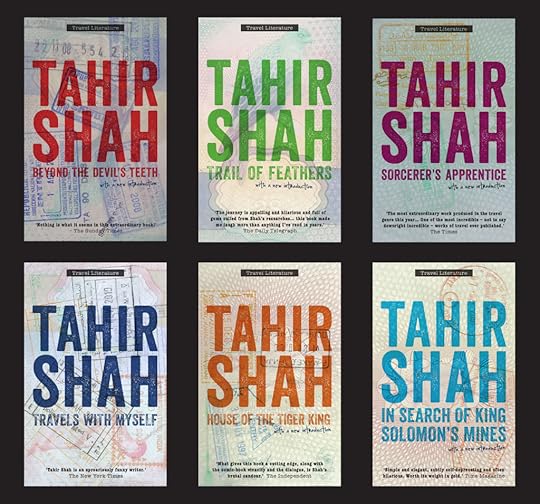Tahir Shah's Blog, page 5
May 21, 2013
Q&A on The Caliph’s House
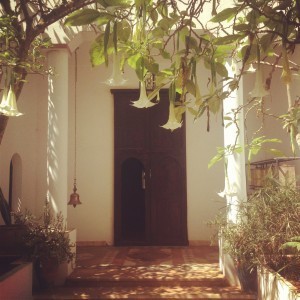 I am occasionally interviewed via email or invited to participate in a Q&A for a course that is reading one of my books. I thought I’d share this one with you, which discuses The Caliph’s House:
I am occasionally interviewed via email or invited to participate in a Q&A for a course that is reading one of my books. I thought I’d share this one with you, which discuses The Caliph’s House:
1. Why did you choose to express your feelings through imagery, rather than express them directly?
That’s a good question and one I have never been asked before. I wrote The Caliph’s House not long after 9/11, and I had that atrocity in my mind all the way through. It was really important to me to try and show Morocco from the inside out, and in a way that American people especially could receive. I wanted to show the kingdom in ways that were not merely descriptive, but touched the senses, as well as reaching an audience through anecdotes. It was difficult to do, but I am always so happy when people write to me saying that the book changed the way they regarded Morocco — ie as not “just another” Arab country.
2. Did you realise that the Arabic meaning of the characters’ names in the book correlate to their personalities, or is this coincidental?
It’s largely coincidental. I must admit that I changed some of the names. I did this because I was fearful of intrusion if the book was a success. And, in the years after it was published, we received hundreds of people turning up out of the blue. The guardians are very important to me and I don’t like the thought of them being bothered for something I wrote.
3. How was your book received in Morocco?
I was extremely fortunate with the reviews. TIME Magazine rated it as one of the Top 10 Books of the Year, and almost all the other reviews — from the NY Times to the London Daily Telegraph — were very kind. I think people appreciated that I wasn’t trying to impress them and be a Morocco-know-it-all. I am not an expert on Morocco, but just someone who loves the Kingdom very very deeply. This country has been incredibly kind to us, and so I just hope my positive writing about it is a small way of giving something back.
4. Did you ever reach a stage where you wanted to leave Morocco?
I could never imagine not having Dar Khalifa. It’s so twinned with my soul that I can’t celebrate my love for it enough. Yes, sometimes I go crazy because something’s bothering me — but that’s usually a reflection of me rather than of Morocco. I’m the kind of person who’s usually got a hundred projects on the go, and I get irritated if things take longer to get done than I’d like. But that’s most probably a sign for me to slow down rather than for Morocco to speed up.
5. Are there any cultural contrasts that you still see today?
Yes… about two miles from Dar Khalifa there is on the ocean a magical little island called Sidi Abdur Rahman. It’s tiny — about the size of a couple of tennis courts — and it’s inhabited by ‘sehura‘, witches. People go to them for solutions to problems in their lives. It’s been there since long before Casablanca, and is known to everyone in the city. All was well until two years ago, when Africa’s biggest shopping mall opened about half a mile from it. It looms there, a futuristic eyesore next to this magical crucible of history and folklore. The island was always hard to reach, especially in high tide, as you had to wade across, or go over in a rubber ring. But when I passed this afternoon I saw — to my horror — that a huge stone bridge has been built right up to it. I stopped my car and asked someone selling ice cream on the beach. He told me that the witches are being cleared out now, and that the island will become a tourist attraction. I can’t hide my sadness.
6. Is all the information in the book anecdotal or did you adapt some of the stories/people to suit your audience?
I was careful how I crafted the book and told the story. I planned it in detail, as I usually do my books. And I did indeed shape material to make it fit nicely, but not nearly as much as I thought I would have to. I just kept copious notes and found that the stories told themselves. It’s a great feeling sitting at a laptop, writing a book that writes itself. It’s so much fun.
April 3, 2013
New Releases from My Backlist
I’m very pleased to share with you the release of my travel backlist as ebooks. Each book has been updated with a new introduction, with the exception of Travels With Myself, my 2011 release. Trail of Feathers will also be available very soon.
Get your copy now:
Beyond the Devil’s Teeth
Sorcerer’s Apprentice
In Search of King Solomon’s Mines
House of the Tiger King
Travels With Myself
March 26, 2013
Q&A with Tahir Shah
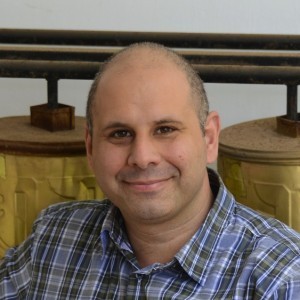 I just did a Q&A with myself, based on some of the questions I’m asked on a regular basis.
I just did a Q&A with myself, based on some of the questions I’m asked on a regular basis.
WHAT’S THE DIFFERENCE BETWEEN WRITING FICTION AND NON-FICTION?
There are both huge differences and huge similarities. For me, book writing (any writing for that matter) is about storytelling. Tell the story in the right way and the reader will do a kind of dance through your work. The most important thing for me is that my reader has the right experience, and that’s achieved by giving a great deal of thought to the way a passage will be read. I devote time to thinking about the reader whether I’m writing fiction or non-fiction.
Naturally, though, with fiction you can let yourself loose a whole lot more. But, having said that, I think there’s enormous scope for non-fiction writers (especially travel writers) in observing what they think they know and understand, in new ways. It’s a great challenge, but one that pays great dividends when you get it right.
HOW DO YOU COME UP WITH IDEAS FOR NOVELS?
I have ideas all the time. They often start with a word or a phrase, or a photograph, or something strange that I overhear someone saying to their friend on a bus. It doesn’t really matter where it comes from, but rather how you use it. At my desk, I write ideas down on coloured Post-It notes and stick them on the wall. Sometimes the wall looks likes a field of spring flowers, because there are so many ideas stuck up there.
And what works for me is to live with an idea – to see it up there on the wall day after day, and to turn it around my head in idle moments. Sometimes I struggle hard to fill in the gaps, but I find that the more I think about something, the deeper it goes into my head. It whirs away there and then one day – or night – I all the dots join up. It’s a kind of magic of the subconscious.
WHAT’S THE BEST WAY TO WRITE?
Whatever works best for you. That’s the right answer. And the thing is that most people remain amateurs because they don’t take it seriously, really seriously. Writing is a craft, one that you have to learn and work away at. I cringe when I see some of the earlier stuff I wrote. But, it was all part of a learning process, and I like to hope that my work is getting better all the time.
As for me, I find that what works best is to plan a book, and then to write 3000 words a day, every day, until it’s done. I write about 500 words an hour, and find that I can sit down easily for six hours a day. I also find that if I’m tired it’s best to go back to bed for half an hour, otherwise complete rot comes out. And the worst thing you can have is complete rot. It’s impossible to edit.
The other thing that I swear by is the idea of writing for oneself. I know I said that I keep my readers in mind, but I also try to write material that pleases me, and sends a shot of electricity down my spine – even when I’ve read it fifty times. Please yourself, and others will be pleased too.
HOW WOULD YOU CHARACTERIZE WRITERS IN GENERAL?
Writers are observers of the human condition. They are usually a mixture of genius and sloth, and are the kind of people who can’t hold down a real job. And I see that as a good thing. They are usually neurotic and traumatized by a sense of guilt at not producing as much, or as good, work as they ought to be doing.
I get very very annoyed when I see extremely talented writers who don’t push themselves. In my opinion, everyone could write four or five books a year. After all, if you were a carpenter making tables, you would be expected to make more than one or two tables every couple of years.
I am completely at war with publishing mainstream because I think publishers have shaped authors’ work in the most dreadful ways, and have encouraged them not to produce. The reason’s simple – because publishers are completely crap at doing what they’re supposed to be doing – selling books.
WHAT DO YOU LOVE ABOUT WRITERS?
I love that they’re always available to meet for a cup of coffee in the middle of the afternoon. And I love that they are dreamers. After all, a world without dreamers would be an odious place.
WHAT DO YOU HATE ABOUT THEM?
There’s one thing that gets me riled up, even more than when I think about publishers… and that’s writers who go about being all self-important. I can’t stand authors who talk down to anyone and imagine that they are somehow superior, and that their work is pure genius. Those are the people who are normally terribly self-conscious and insecure, the ones who put on a façade when out in public.
Sometimes, very rarely now, I go to literary festivals. They tend to make my flesh crawl because writers are trying to impress everyone. When I go to those things I’m just so incredibly grateful that anyone would buy my books at all, and I feel very awkward when people clap at the end.
WHAT ARE YOUR FEELINGS ABOUT EBOOKS?
They are a good thing. It’s that simple. Because anything which gets people reading is a good thing. eBooks remind me of the Tale of the Sands.
In the story, a stream wants to cross the desert. He starts crossing the desert but instantly his water is sucked down into the sand. He cries out:
‘Help! Help! What am I to do, I’m being sucked in?!’
Then he hears a voice, a voice that is the desert speaking to him.
‘Oh little stream, you are young and silly and you don’t realize that in order to cross my great expanse, you are going to have to change your form.’
‘But I’m a stream,’ says the stream, ‘and all I know to do is to trickle forward and so that’s what I’m going to do.’
With that, the stream tried to cross the desert a second time. And, as before, he failed.
Then the desert spoke again.
‘Oh little stream, think back in your memories and try to remember a time when you were different. Try to remember yourself in another form.’
The stream thought and he thought, and he thought and he thought, and suddenly he remembered that long before he was different.
The desert then said: ‘Oh stream, throw yourself into the wind, and become mist, so that you can be carried over my vast expanse on the breeze.’
And that’s what the stream did.
When eventually he reached a cool rock-face on the other side of the desert, he condensed into a stream again, and continued to trickle until he reached the sea.
And that for me is the situation with eBooks. Yes, yes, I love printed books, but in order to reach new people, books have to change their form. The Romans and Greeks never had printed printed books like we do. They had handwritten scrolls. And eBooks and e-readers are just a new extension of the craft.
YOU ARE FROM A FAMILY OF WRITERS. WHAT’S THAT LIKE?
My father was the writer Idries Shah, and my aunt, Amina, has published books, too. Their father was the Afghan savant Sirdar Ikbal Ali Shah, who wrote numerous books in the ’twenties and ’thirties. And their mother wrote several books under the pen-name Morag Murray Abdullah. My twin sister, Safia, is writing stories and children’s books now. And my elder sister, Saira, has a new book (MOUSEPROOF KITCHEN) which is published next week.
What’s it like?
It’s a great thing. I like to think that my grandfather, my father, and I have all considered some of the same themes – and faced the same problems – but have all been of service to each other as well.
WHY DO YOU HATE THE PUBLISHING INDUSTRY SO PASSIONATELY?
Publishing is unlike any other business. My friends who work in publishing will, I hope forgive me for saying this, but it attracts people who have almost no business sense. Some of the nicest people I have ever met are publishers, but they are also the most lackluster bunch of amateurs.
I like to imagine starting a publishing firm and filling it full of hard-nosed businessmen, the kind of sell perfume to the masses or plastic buckets door to door. Publishers print zillions of books and then are amazed when they don’t sell… and, they do next to nothing to sell them.
I am absolutely thrilled to think of all the two-bit second-rate publishers going bankrupt. There are one or two I’m eagerly awaiting at this very moment to go down. One in particular – a firm based in west London with the initials IBT – has just reminded me how totally derelict and forlorn the publishing industry has recently become. For anyone reading this who knows the British sit-com Only Fools and Horses, much of British publishing resembles something worthy only of Delboy Trotter.
WHAT’S THE FUTURE?
The future is a new system in which authors sell their work directly to the public as eBooks and Print On Demand. And there will be high quality limited editions, too. It’s not really a new system (reaching the public directly that is), but rather is one that predates conventional publishing. After all, authors used to go to printers and print up copies of their work, and then sell them through bookshops. The bookshops then got wise and formed themselves into publishing firms. And that’s really where everything went awry.
I want to see a future (and, believe me, it will come soon), in which authors are at the top of the pyramid, and in which all the second-rate college dropouts get kicked out of the equation. Look at almost any mainstream publisher and you’ll find endless losers doing dead-end jobs, all of them fearful that they’re going to get found out and fired. In the brave new world authors will hire editors themselves, and will see the books they want to produce reaching the market – rather than the books that a bunch of monkeys on fence want to see there.
Take my word for it, we’ll never look back.
March 21, 2013
Get Your Limited Edition Copy of Scorpion Soup
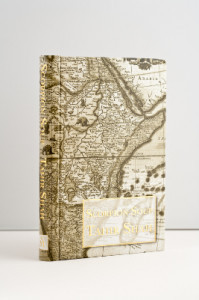 As announced on my Facebook page yesterday, Scorpion Soup has now reached the UK warehouse, which means that all orders to the UK and to continental Europe will be available for shipping starting this afternoon.
As announced on my Facebook page yesterday, Scorpion Soup has now reached the UK warehouse, which means that all orders to the UK and to continental Europe will be available for shipping starting this afternoon.
There were some questions about shipping costs to continental Europe, and we’ve found a less expensive way to take care of this, so all book orders to continental Europe will pay the same as the UK orders. They will be sent via Royal Mail.
Order one copy of Scorpion Soup to the UK or to continental Europe using this link. Generally speaking, books will be shipped within 24 hours after an order is placed, for Monday-Friday orders.
Pre-orders for the US can be placed using this link. All orders will be uploaded to our fulfilment system as soon as they’re received by us. The books should reach the US warehouse this week or next, and books will ship out automatically as soon as they’re checked into the warehouse.
As I mentioned before, we’ve tried to keep the purchase price on this book as low as possible, which is why I’m only making them available for sale through my website for a limited time. Once they go online to other retailers, we’ll have to raise the price to cover commissions and fees.
At this point, there are links to purchase one copy or five copies. If you would like a different amount, please email secretum.mundi at gmail dot com, and someone can check on the cost of shipping for you.
Many, many thanks for reading! I hope you enjoy this book.
March 4, 2013
Worrying Times in the Shantytown
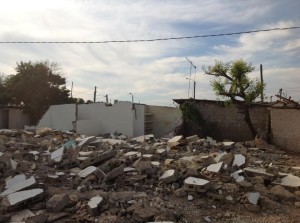 These are worrying times in the shantytown within which we live. Just as the big nasty apartment building mushroomed up without any warning in the bowels of the bidonville behind us, there’s been almost no official word about what’s going on with regard to breaking down the homes.
These are worrying times in the shantytown within which we live. Just as the big nasty apartment building mushroomed up without any warning in the bowels of the bidonville behind us, there’s been almost no official word about what’s going on with regard to breaking down the homes.
I’ve heard it said that the people who bought apartments in the expensive building behind paid the first slice of their cash on nothing more than an artist’s impression. The second tranche is payable now as I understand it, now that the concrete super-structure is complete.
The problem for the developers is that no one that’s paid a big chunk of cold hard cash is going to slide any more their way until they can drive in and have a look at the work done so far. And those people aren’t going to pay a single dirham more until there’s a nice plush road, as there is on the plans.
Meanwhile, the larger problem with many of the shacks is that they lie in the path of the road. I have heard it said, too, that 32 families were paid off last year. But they didn’t move… of course they didn’t, because in Morocco anyone with any cash is immediately cajoled into lending it to extended family and friends.
The first houses to have been knocked down were mostly bashed down with sledge hammers… the work of men from the building site. Needless to say, there are many glum looks and plenty of bad feeling. But, as anyone reading this can I am sure imagine, a handful of impoverished people in a shantytown have little hope when pitched against what is one of the Kingdom’s most powerful building contractors.
Two of our guardians live in the bidonville, and our maid. Thankfully, they live just out of the path of the road and so, hopefully, will be saved a little longer.
I’ve resisted taking pictures while walking through because this is a sensitive time. And the last thing I’d want if my house was being knocked down was people taking snaps of it all.
February 14, 2013
Interview for Vilnius Book Fair in Lithuania
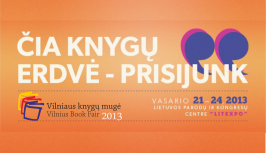 As I mentioned before, I’ll be in Lithuania next week for the Vilnius Book Fair. I just did a short written interview with the main Lithuanian newspaper, which I’m sharing below for you:
As I mentioned before, I’ll be in Lithuania next week for the Vilnius Book Fair. I just did a short written interview with the main Lithuanian newspaper, which I’m sharing below for you:
1. Gabriel Garcia Marquez has written nonfiction book, Living to Tell the Tale. Do you share his thought, that a man has to live in such way, that he would have tales to tell? Personally for you what is more important – to hear or to tell stories?
Stories are a life-blood that runs in all our veins. Most of the time we forgot that they are there – rather like the air we breathe. We forget that we’re breathing but of course we have to in order to live. And I think stories work in the same kind of way. When we dream we dream in little stories, sometimes they’re no more than fragments, and all through the days we get little flashes of stories – something that happened, or an idea of whatever. Look at yourself through a typical day interacting with people – you can’t help but use elements of storytelling in recounting information and ideas. Storytelling is a sixth sense to us all. As for hearing and telling stories, they are two parts of the same thing: Yin and Yang. They’re both so important and they are a bedrock to which human life is firmly nailed.
2. You once said that as a child you were told stories from morning to night. Do you have a story, which you could call the first one you remember? If no – tell us one story which is the most important, the most dear to you?
The story that stuck in my mind from my earliest childhood is called the “Tale of the Sands”. It’s very simple but it has a profound effect on a child’s thinking, or an adult’s thinking for that matter:
A stream wants to cross a desert which it has arrived at one day. He starts flowing forward into the desert, but realises that he’s going to be absorbed, as his precious waters are sucked up by the sand. The stream is very unhappy and begins to weep. Then he hears a voice. It’s the desert, which is saying, ‘Hello stream, if you want to pass across me and get to the ocean, you will have to change your form.’ The stream doesn’t understand. He starts flowing into the desert again because that’s how he’s been programmed to be. But he gets dried up in the sand a second time. Again, the desert speaks to him. It says, ‘Change your form as your ancestors have done, and you will be able to cross me.’ The stream thinks very very hard and remembers that his mother stream had said that in ancient times streams changed their form when there was no choice. And so, the stream allowed himself to turn into mist and to drift gently over the desert, where he condensed and became a stream again. And that’s the story called “Tale of the Sands” – my very favourite.
3. Anyway somebody can say: “Oh, he was unhappy child! He only listened to stories and didn’t have time to play with friends! He lived in a fantasy world!” How do you remember yourself as a child? Have you dreamed to become a writer in the future?
I was in my ‘own world’ as a child. I’ve never told anyone this but I had a secret world that I would imagine myself going to to escape. All sorts of amazing things happened there, and I always imagined that you reached it by climbing through a mirror, the mirror in my bathroom. It was so powerful to me because it was a realm which had no boundaries, a realm in which I was alive in a way that no human is ever alive on earth. And it was that feeling – the one that we get when we hear the words “Once upon a time” – that I have long for. I have always searched for that bathroom mirror in my adult life – for ways to climb into the real world of my imagination, itself a kind of default setting of us all.
4. Are your children Ariane and Timur told stories from morning to night too? Or maybe they are reading your books? Do they like them? Do they plan to be writers too?
They love stories, and I make sure they get a lot of stories coming to them in all sorts of ways. They read like crazy, and they like TV and new medias as well. I tell them to always remember to look for the stories in life, and to work out when the story has something of value to give you. Often we are blind to the nugget of wisdom in something very simple, and I see it as our responsibility to draw our wisdom from the things around us.
5. Now you are famous writer. Some people are calling you the classic of travel literature here in Lithuania. How do you feel when you are put in one row, in one line with Joseph Rudyard Kipling and other great travel authors of the past?
I encourage everyone I meet to tell stories and to share what they have learned. I am actually writing this from India, because I am here covering the Kumbh Mela festival (100 million people!). A few minutes ago I was chatting to a man who had come to bring me a bottle of water. I asked him about his life and whether he knew stories that had changed the way he sees the world. He told me that as a child his mother would tell him a story each week, a special magical epic story. And he kept the stories in a box. I asked if they were written down. ‘No, no,’ he said quickly, ‘they were magical stories and so you couldn’t ever write them on paper, but you could imagine them in your mind.’ The man said, ‘to most people the box looked very empty and it certainly didn’t feel full and heavy, but to me, I knew it was full… and only I could see the stories in there – the pirates and the genies, the magical islands and the monsters.’ And he’s so eight because the magic of stories is the way they hook on to us and become our own – something we can share but never fully explain.
6. Can you imagine your life, if you hadn’t launch on an adventure to go from London apartment to the Caliph’s House in Casablanca in 2003? Can you call this adventure the most exciting moment in your life?
Sometimes in life it’s very important to cut yourself away from the ‘comfort zone’… you have to get out and walk a new path. It’s daunting but imperative to do it. The most important thing at times like that is not to think too much but to follow your heart. And never ever ever listen to anyone who is trying to hold you back.
7. Can you describe in five sentences what is Casablanca to you now, despite of that we have read many things in your books The Caliph’s House and In Arabian Nights?
Casablanca is the doorway to a twilight zone where reality and fiction join. It’s a place in which fact and fantasy come together as a kind of hybrid, one that leads to the most extraordinary possibilities. I like to think that our likes in Morocco are touched daily by layers of culture and society that are at the foundation of human society. I am totally fascinated at living in places that stand at a crossroads upon ancient cultural landscapes, and Morocco is certainly one. Afghanistan, where my ancestors came from is another, and India is a third. It’s very important, I believe, to get yourself in a mental state at which you can absorb currents of culture that may remain invisible to others. Open your mind, and the most magical world slips effortlessly in.
8. For some Lithuanians, who have never been in Morocco, Casablanca is associated with Michael Curtiz film. What do you think about this film?
I love Casablanca, although of course it’s got very little on the surface to do with the city of the same name. As a piece of storytelling there’s a little bit of it all – love, danger, intrigue, honour, duty etc. I have just finished written a novel which in a small way is a hymn to that film. It’s called CASABLANCA BLUES and is about young American guy who travels to Casablanca in a mid-life crisis and falls in live with a girl there. He soon realises that in Casablanca nothing is what it seems.
9. After having published a number of books with traditional publishers, you made the move to self publishing in 2011 with your print-on-demand book Travels With Myself, which was published using Lulu.com. You later took your self publishing efforts a step further in 2012 with the release of Timbuctoo, a limited edition hardcover that was designed by your wife Rachana. Why you decided to make the move to self publishing?
Publishing is changing and I am a hugely vocal proponent of the new model – a model that is only now emerging. I have loathed the way that publishers have controlled the body of work that authors create, have taken the funds they make, and have tried to shape material. I have a very strong idea of how I want my books to be and how I want my entire body of work to be. I don’t want some publisher in New York or London telling me how to do what I can do better than any of them. They can’t write books, and they can’t even sell them most of the time. The great thing is that now with the world of ePublishing we don’t need them. I’m so thrilled by that! Beyond that, I want to create beautiful printed books again, the kind that were done through history until the number-crunching accountants refused to allow fine publishing. The future will be different, but one in which readers and writers are kings.
10. How would you introduce your book Timbuctoo to Lithuanian readers, who are going to buy it – published recently – in Vilnius book fair?
TIMBUCTOO is a labour of love from me, and is the case of a story that I heard which stuck in my mind. It became an obsession (ask my poor wife) and it revolved around my mind for years. Most of all i felt a hugely powerful responsibility to pass it on. And I did this in the most elaborate way I could think of –after all I felt a big sense of duty to Robert Adams, the main character, that I would do justice to his tale.
11. You are not only prolific writer, but journalist, author of documentaries too. Do you have any mission as a journalist? Can you tell the most fearful and the most exciting stories from your career as a journalist?
I have covered a lot of strange journalistic stories, many are detailed in TRAVELS WITH MYSELF. They have been important because they have shown me the various interwoven layers of life in all sorts of lands and cultures. For example, I once spent time on women’s Death Row in the US state of Alabama. I got to know the women there, the main one I spent time with was later electrocuted. And I have written extensively about India – including my experience of swallowing a live fish to cure my asthma. I think journalism is the only way to craft one’s style as a writer. There is nothing like it.
12. Are you expecting to collect some stories for your books here in Lithuania?
I have been longing to come to Lithuania for more than 20 years and so my dream is coming true. When I was young my aunt, the great storyteller Amina Shah, told me a Lithuanian story about the dream of the Duke of Gedinimas. I’ve always remembered it. And I am hoping that I will hear stories from Lithuanian society that are in the hearts of all Lithuanians, both young and old.
January 30, 2013
Upcoming Projects for 2013
I’ve been posting on my Facebook page about upcoming projects for the first half of 2013, without sharing too much detail. I’d like to include a quick overview of things to come:
Newsweek
I’ll have an article coming out in Newsweek (now online only), in the next couple of months. I’ll post on Facebook as soon as it’s online.
Backlist ebooks
I’ll be releasing ebooks from my backlist starting very soon. We’re still working on the cover art, but they’ll be coming out one by one in the next couple of months.
Lithuania
I’ll be speaking at the literary festival there, so if you’re based in or near Lithuania, I’d love to see you.
Scorpion Soup limited edition hardcover
This is now available for pre-order over at the Scorpion Soup website, and books will be shipping out in late March. There are purchase options for both the US and the UK, which is where the books will be warehoused. If you’re in another country and would like a copy, please contact me and I’ll let you know what the extra shipping fees are. I’m trying to keep the cost down on this book by offering it only on my website.
You can also enter one of two contests on Goodreads for a chance to win a copy of the limited edition hardcover. There is a contest for US readers and one for UK readers.
Scorpion Soup en español
We’re also working on a Spanish translation of my recent release, Scorpion Soup. It’s over half-way finished, and then will go into editing before its release. It should be out fairly soon, and I’ll be sure to post on my Facebook page when it’s available.
Casablanca Blues
This is one of my upcoming releases for 2013. I’ve completed the first draft, and it’s being edited now.
Blaine Williams is a thirty-something New Yorker with an mid-life crisis and an obsession of the movie Casablanca. His world collapsing around him, he flees to the one place he thinks he knows and understands. A fragment of security in his troubled imagination, Casablanca the genuine article reveals itself as a roller coaster ride of danger, intrigue, and true love — a realm where nothing is what it seems.
Eye Spy
This is another of my upcoming releases for 2013. I’m half-way through the first draft on this.
While in Central Asia saving the sight of a debauched dictator, Dr. Robert Kaine, the greatest eye surgeon of his generation, unwittingly tastes a pie filled with cooked human eyes. Rather than being revolted by the dish, he adores it, and finds that it has an astonishing and ameliorating effect on the psyche. As the craving sets in, he will stop at nothing to get more of the illicit food.
Against a backdrop of an epidemic eye disorder called Occulosis, that threatens making everyone alive blind, Kaine is the one man who can save human sight… while robbing anyone he can of their eyes.
January 10, 2013
Scorpion Soup: ebook available now!
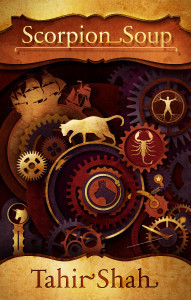 If you’ve been following me on Facebook, you know that the ebook edition of Scorpion Soup was released earlier this week. It’s already received several reviews on Goodreads, as well as Amazon US and Amazon UK, and it’s been featured on at least one blog that I’ve seen so far.
If you’ve been following me on Facebook, you know that the ebook edition of Scorpion Soup was released earlier this week. It’s already received several reviews on Goodreads, as well as Amazon US and Amazon UK, and it’s been featured on at least one blog that I’ve seen so far.
Scorpion Soup has its own website, with a full list of the eighteen stories, a discussion of the frame story, my take on storytelling, and some background information on the Blaeu maps, ten of which are included in the limited edition hardcover of Scorpion Soup.
The ebook is currently available for purchase on Amazon US and Amazon UK, and it will be available shortly on other major ebook retailers, such as Apple, Barnes & Noble, Gardners, Ingram, Kobo and Waterstones.
If you’re looking forward to the limited edition hardcover, with its 10 fold-out maps, it will be released on March 25th. It’s been prepared along the lines of Timbuctoo, with the same attention to detail. It’s available for pre-purchase now on the Scorpion Soup website.
I hope you enjoy it. Thank you for reading!
December 17, 2012
Timbuctoo Holiday Sales
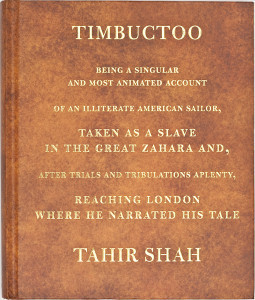 Several people have emailed me lately requesting bulk pricing for Timbuctoo so they can purchase multiple copies for the holidays. I’ve spoken with my warehouse people, and they said that orders need to be in by tomorrow, 18th of December at the latest in order to reach you by the holidays. Because we’ll be selling these directly, we can offer a huge discount on the books.
Several people have emailed me lately requesting bulk pricing for Timbuctoo so they can purchase multiple copies for the holidays. I’ve spoken with my warehouse people, and they said that orders need to be in by tomorrow, 18th of December at the latest in order to reach you by the holidays. Because we’ll be selling these directly, we can offer a huge discount on the books.
Regular UK pricing of Timbuctoo is £29.99, currently available on Amazon at a discount of £25.49. We can offer you the bulk price of £20 for 5, 10, or more books (in multiples of 5).
Regular USA pricing of Timbuctoo is $49.99, currently available on Amazon at the same price. We can offer you the bulk price of $33 for 5, 10, or more books (in multiples of 5).
If you’re in the UK, and would like to order 5 books to be delivered to one address, please order here:

If you’re in the UK, and would like to order 10 books to be delivered to one address, please order here:

If you’re in the USA, and would like to order 5 books to be delivered to one address, please order here:

If you’re in the USA, and would like to order 10 books to be delivered to one address, please order here:

November 22, 2012
Southside House: tickets still available
 Tickets are still available for my talk at Southside House in Wimbledon on December 4th, 2012 at 7.00pm. Seating is limited, so if you’re interested in coming please book now. I look forward to seeing you there!
Tickets are still available for my talk at Southside House in Wimbledon on December 4th, 2012 at 7.00pm. Seating is limited, so if you’re interested in coming please book now. I look forward to seeing you there!
Tickets are £12.50 and include a glass of wine
*Advance booking only: Tickets from the administrator*
Tel: 0208 946 7643
email: info@southsidehouse.com

